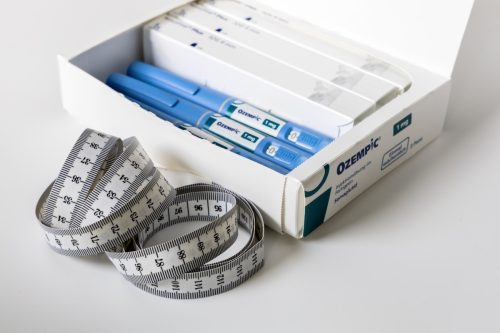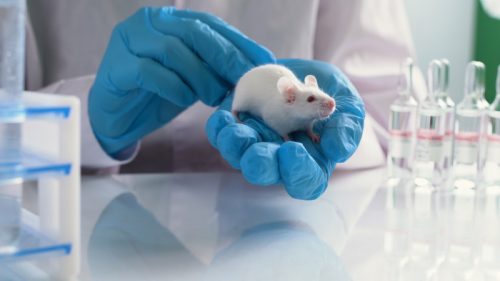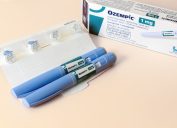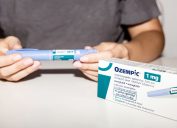Brand New Drug Reverses Obesity With No Real Side Effects, Researchers Say
Efforts are underway to produce new weight-loss medications for patients.

While Ozempic and other drugs like it have been touted by doctors and celebrities alike as fast and easy ways to lose weight, these drugs can be costly and hard to get your hands on. They have also faced backlash over reports of users experiencing sometimes debilitating side effects. With that in mind, researchers are constantly studying new options that could produce the same dramatic weight loss, without the complications—and one team claims they've found just that. Read on to learn about a new nanogel treatment that could potentially reverse obesity without major side effects.
RELATED: New Drug Has People Losing 60 Pounds on Average, Research Shows—And It's Not Ozempic.
Ozempic has been tied to several concerning side effects.

The semaglutide injection Ozempic was approved by the U.S. Food and Drug Administration (FDA) as a treatment for people with type 2 diabetes, but it is now being prescribed off-label for weight loss. This medication, and others like it, works to mimic the natural hormone GLP-1, slowing down digestion and decreasing appetite. But Ozempic is also notorious for unpleasant gastrointestinal side effects, including nausea, diarrhea, and constipation.
And there can be more serious complications if it slows down digestion too much.
A new JAMA study found that medications like Ozempic can cause three severe stomach conditions in patients without diabetes: stomach paralysis, bowel obstruction, and pancreatitis. Reports of these issues impacting users even prompted a lawsuit to be filed against Novo Nordisk, the maker of Ozempic, in August, with the suit alleging that the company has demonstrated a "failure to warn" patients about the potential side effect of gastroparesis, or stomach paralysis.
In September, the FDA updated the label for Ozempic to acknowledge reports of some people developing ileus, which is the medical name for a gastrointestinal disorder that can cause bowel obstruction.
Now, researchers say they've found a new medication that could have dramatic weight-loss results without these troubling side effects.
RELATED: New Drug Has People Losing 19% of Body Weight, Research Shows—And It's Not Ozempic.
A new drug reportedly reverses obesity with no real side effects.

Many patients have stopped using Ozempic because of the side effects they've experienced. But what if you could get similar weight-loss results without any related issues? That's the question behind what one University of Massachusetts Amherst (UMass) biomedical engineer is trying to accomplish, SciTechDaily reported.
Biomedical engineer S. Thai Thayumanavan has designed a nanogel delivery system in his lab to deliver a drug exclusively to the livers of obese mice and reverse their obesity.
"The treated mice completely lost their gained weight, and we did not see any untoward side effects," Thayumanavan said in a statement.
RELATED: Ozempic Patient Reveals "Excruciating" New Side Effect.
They say targeted therapy is the key.

Thayumanavan, who works as the director of the Center for Bioactive Delivery at the UMass Institute for Applied Life Sciences (IALS), detailed the findings he and his team discovered with this new drug for an Aug. 29 paper published in the Proceedings of the National Academy of Sciences Nexus journal.
The researchers fed a group of mice a high-fat, high-sugar, and high-cholesterol diet for 10 weeks, doubling their weight. The mice were then given a drug every day that was packaged inside a nanogel, and delivered to the mice via intraperitoneal (IP) injection.
"We came up with a very simple approach, using our unique invention—nanogels that we can direct selectively to different targets, which we call IntelliGels," Thayumanavan explained. "They were custom-designed for hepatocyte delivery in the liver."
After five weeks of treatment, the mice returned to a normal weight even as they continued their high-fat diet. But the ability to do this effectively while bypassing unwanted side effects is the results of targeted therapy, according to the researchers.
"We realized we needed to deliver this drug selectively to the liver because if it goes to other places, it could cause complications," Thayumanavan said.
Efforts are underway to translate these findings to humans.

Notably, the team's trials were only conducted in mice. But "considering 100 million Americans have obesity and related cardiometabolic disorders, we became pretty excited about this work," Thayumanavan said.
Now, efforts to translate these findings to humans are being pursued by the start-up company Cyta Therapeutics, which was also founded at UMass IALS.
"There is a significant amount of development work to be conducted between mice and humans," Thayumanavan acknowledged. "But we are hoping it will eventually become a drug."
RELATED: For more up-to-date information, sign up for our daily newsletter.





















